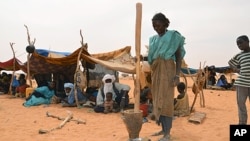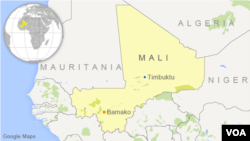The United Nations refugee agency reports thousands of Malian refugees have fled into Niger in recent weeks despite the end of the conflict in Mali's north. The UNHCR says this is the highest flow of refugees since a peace accord between the government and Tuareg rebels was signed in June.
The conflict in Mali erupted in early 2012. French and African troops intervened and retook much of the north from al-Qaida-linked militants in early 2013. But the government only signed a peace deal with separatist Tuareg rebels and other armed groups in the north this June.
Early this year, the UNHCR reported about 47,500 Malian refugees were registered in Niger.
But agency spokesman Lou Dobbs says a projected "peace dividend" of the refugees returning home and other Malians staying put has not happened. Instead, he says, some 4,000 Malians have crossed into Niger from Mali’s sparsely populated east since the start of October.
“Those arriving in Niger say they are fleeing because of lawlessness, extortion, food shortages, inter-tribal rivalry, fighting between herders and farmers, and a power vacuum in the absence of a strong government and military presence in the east," said Dobbs.
Dobbs says the majority of the new arrivals come from rural areas. Female refugees tell aid workers they fled because their animals had been stolen. They said their children could not go to school and public infrastructure had been damaged because national authorities were not there to safeguard them.
He tells VOA this is a very disturbing and unexpected development. He says it appears as though the Malian refugees are making plans to remain in Niger for a long time.
“We have seen people, mainly Tuaregs, who have been moving out of tents and into constructing mud houses," he said. "So, people seem to be looking for the future in Niger, which means they will continue to need help.”
Dobbs says the new influx and unprecedented numbers of Malian refugees is putting a strain on the UNHCR operation in Niger, at a time when its budget is being reduced. He says the emergency phase of the operation is over and funds for next year are to be cut in half from $300 per capita to $150 per capita.
Unfortunately, he notes this will not be enough to deal with the latest, and possibly future, influx of Malian refugees into Niger.





